If you’re considering buying a travel trailer or fifth wheel, you’ll need a truck with towing capabilities. There are plenty of trucks to choose from, and each brand and model will be different.
Choosing the proper tow vehicle can feel overwhelming. This guide will break down each step of the process when trying to find the right truck to tow your rig.
And when it comes to hitching up, Gen-Y Hitch is the highest quality truck hitch on the market. Click the pic below and use code RTHITCH10 to save 10% on all products!

In this article:
- Truck Brands
- Truck Towing Capacity and Payload
- The Best Trucks for Towing
- Where to Compare Trucks for Towing
- Tow Vehicle Features to Consider
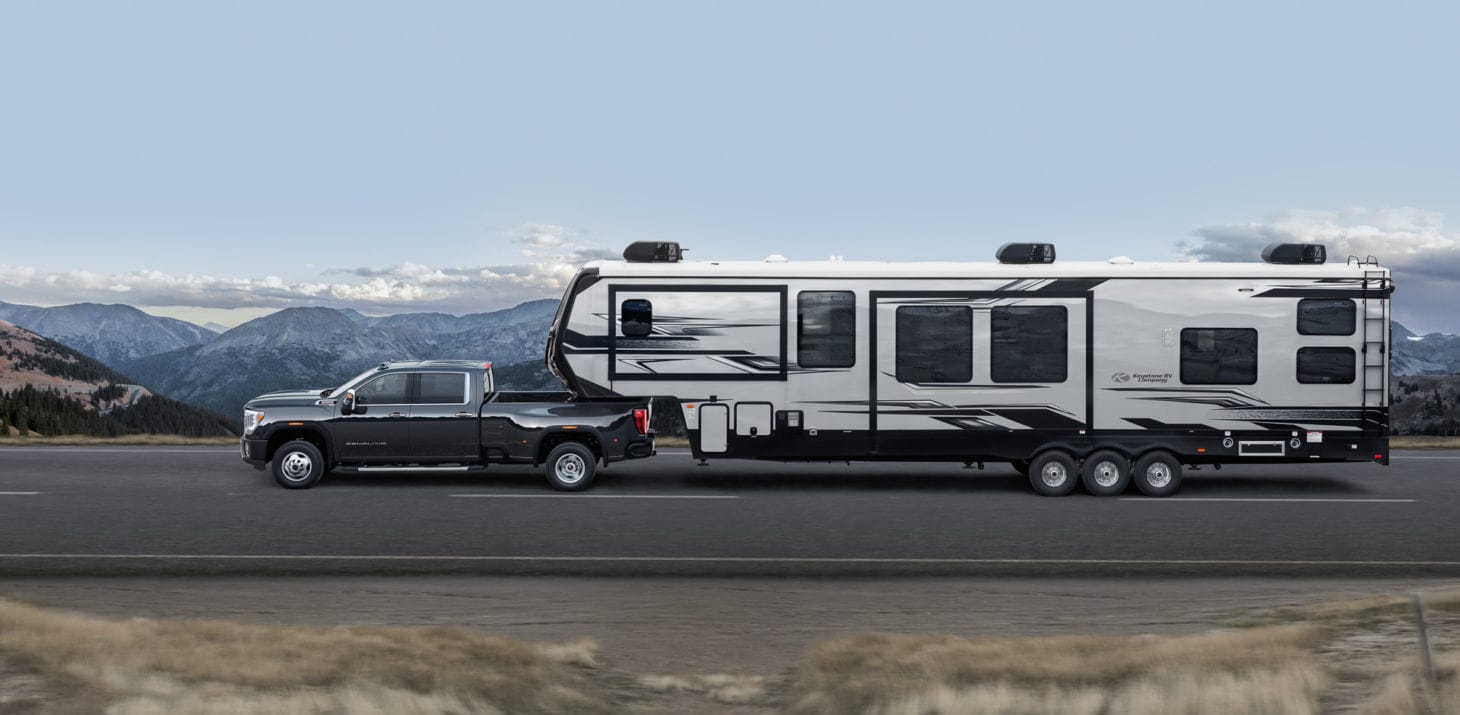
Truck Brands
It’s best to keep an open mind when it comes to choosing your tow vehicle. Try to put any automaker brand loyalty aside, since limiting your truck options can affect the type of trailer you are able to tow.
Automaker quality changes over time and manufacturers constantly develop new features, like towing safety technologies. Manufacturers build vehicles with the same chassis, drivetrain, and design for approximately 4 to 7 years, a period typically known as a generation. When you hear that “the new-gen Tundra is coming out next year,” that means it will be on a whole new platform and the truck will be completely overhauled. From year to year and within the same generation, manufacturers will also make minor updates to bumpers, grilles, headlights, and other features to make the same truck slightly new and improved.
If you love the current generation of the truck you are eyeing, look to see how far into the cycle it is. If there’s a new generation coming out next year, the current one will be discounted. Or, the truck you love could be a model from the prior generation and there may be major improvements coming out soon with the new generation.
Truck manufacturers don’t all change generations at the same time. This allows for increased competition and to keep truck models fresh to consumers. So, if you’re a fan of Ford trucks, know that Ford will most likely overhaul its trucks in a few years, before RAM and GM.
If you are open to any brand, then you can shop around for the right combination of cost and features to find the perfect truck within your budget.
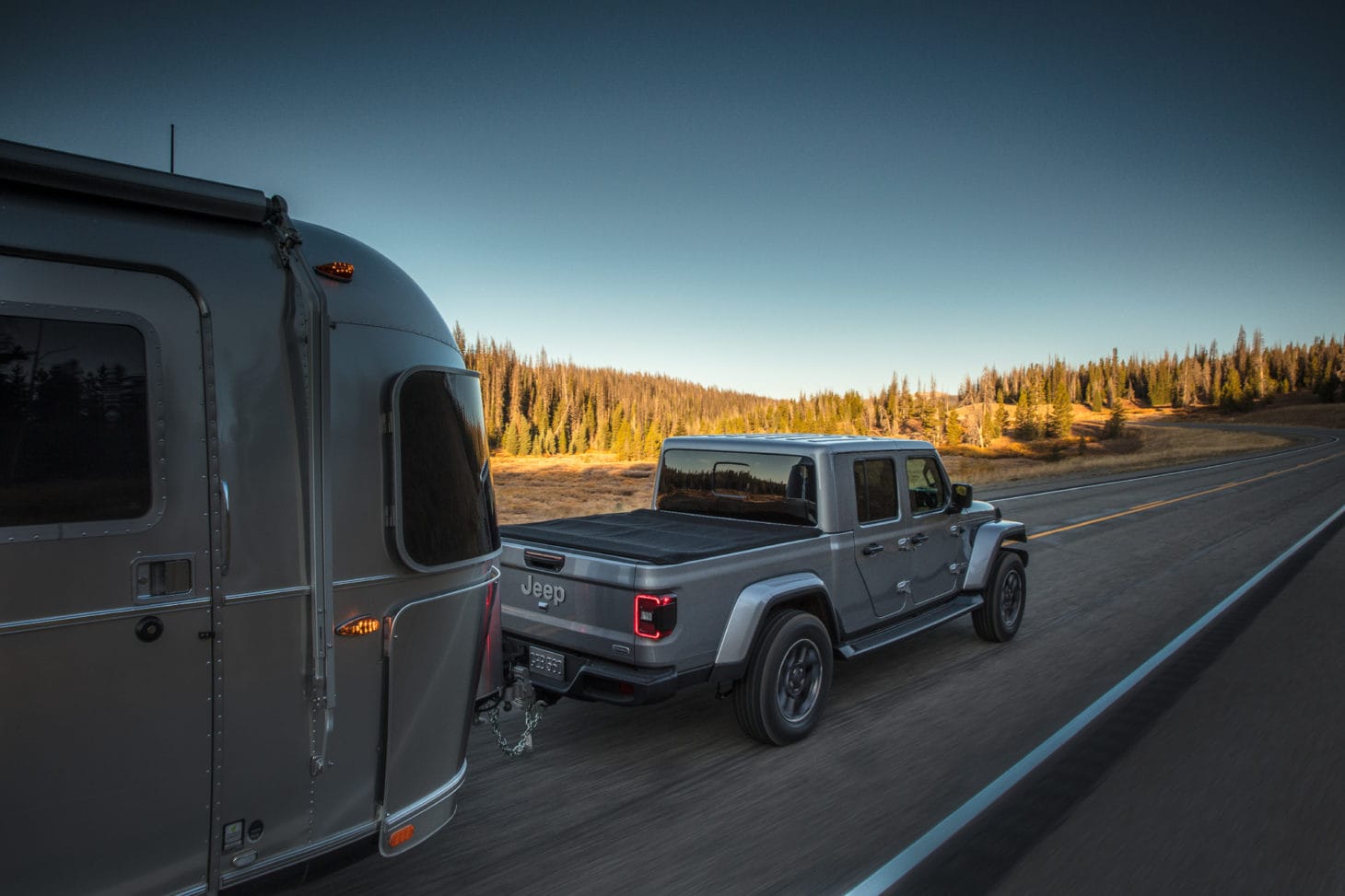
The Importance of Truck Towing Capacity and Payload
Towing capacity is perhaps the most important consideration when choosing your towing vehicle. However, it can be confusing to compare truck models. Automakers compete in torque and toughness, all trying to offer greater towing capacity without crushing the fuel economy.
Just because an automaker claims to be “Best in Class,” that doesn’t necessarily mean it’s the right fit for you—or that the truck you’re looking at is able to live up to the hype. Within the same model of truck, there is a wide range of towing capabilities.
The most capable version of a truck is often the one with fewer luxury options. Generally, a heavier truck with additional upgrades will have a reduced ability to carry cargo. If you opt for these things, they will typically reduce your truck’s towing numbers. For example, off-road suspension—which can be found in Chevy’s Trailboss, RAM’s Rebel, and Ford’s Raptor—is softer and doesn’t handle heavy payloads as well. Luxury features such as leather, sun/panoramic roofs, and bigger cabs all add weight to the standard truck version, meaning less payload capacity.
Engine options also impact towing capacity. A smaller engine means better fuel economy, but it will have less towing capacity than larger engines.
While tow capacity rankings change from year to year, it’s important to spend some time comparing the towing capacity of different truck models. Automakers including Ford, RAM, General Motors, Toyota, and Nissan adopted a uniform method for testing and rating the towing capacity of their pickup trucks, beginning with their 2015 models, which makes it easier to compare them.
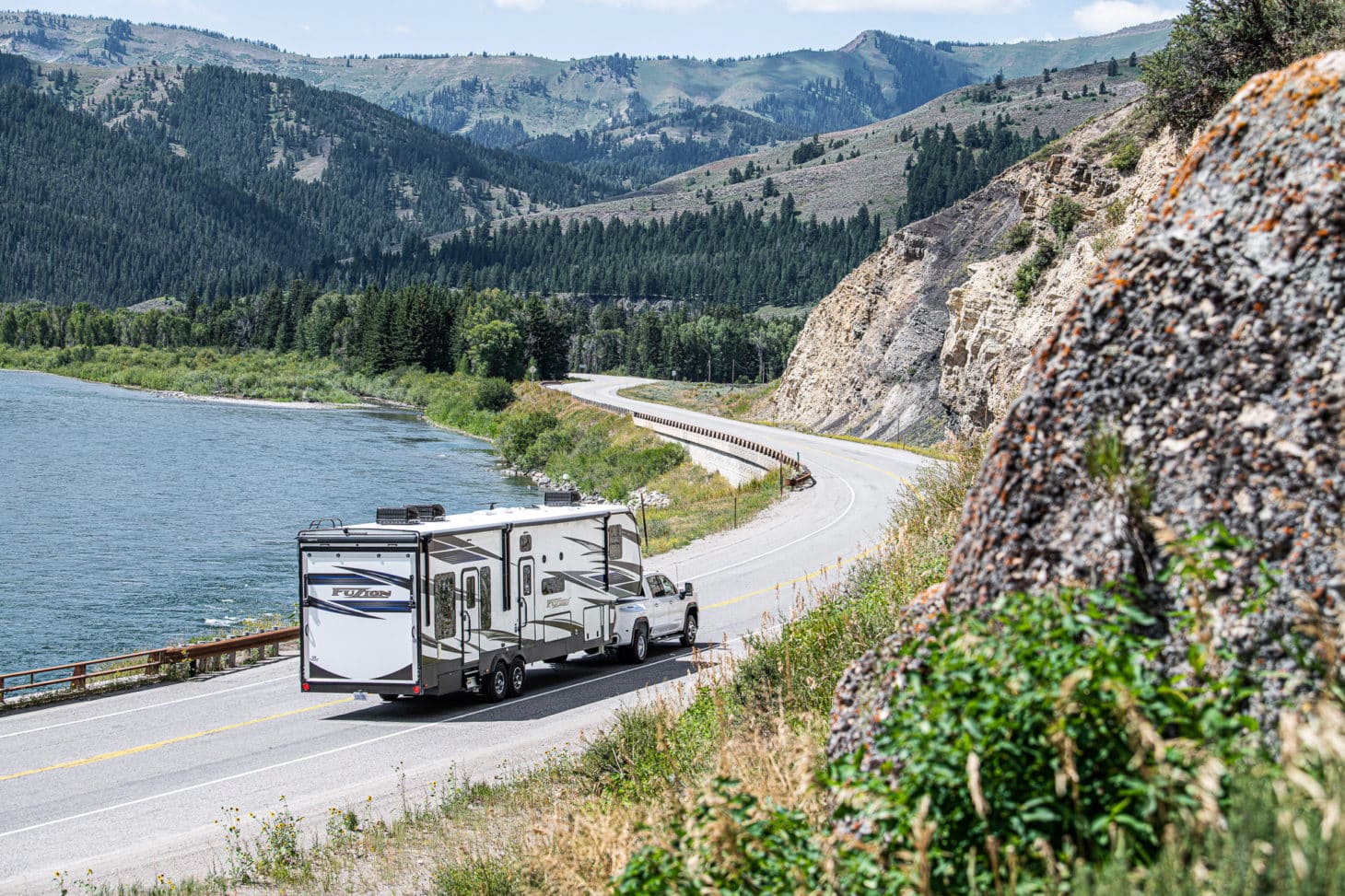
Once you have a few trucks in mind, the best way to understand the specific truck’s towing capacity is to look at the driver’s side door jamb sticker. This contains tire information and payload capacity for the truck—arguably the most important number for towing. At the dealership, look at a different trim level of that same truck and you’ll see how the payload varies.
Whichever truck you pick, your towing vehicle must have a towing capacity higher than the trailer’s GVWR. Keep in mind that weight added to your towing vehicle, such as passengers and cargo, increases your GVW and factors into your vehicle’s GVWR. Head to a truck scale to get an accurate measurement of your GVW and then compare that to your GVWR.
It’s extremely important to understand payload capacity, which is the amount that the truck can hold in terms of cargo. This includes you and your family’s weight, any other passengers (including pets), gear in the cab and bed of the truck, and the weight of the hitch. It’s very common for people to go over payload without realizing it when it comes to RV towing because RVs typically have more tongue weight than boats and other types of trailers.
When a truck is carrying too much payload, the rear suspension isn’t level. This is called sag and can be very dangerous. The nose of the truck will be higher and the steering will feel light. If the truck can’t handle the RV’s tongue weight properly, then the RV will also be unlevel with the nose down. Towing safety is incredibly important as overloading your trailer or vehicle can cause a crash.
And when it comes to hitching up, Gen-Y Hitch is the highest quality truck hitch on the market. Click the pic below and use code RTHITCH10 to save 10% on all products!

Considerations When Towing a Fifth Wheel
Since fifth wheels are usually much heavier than comparable trailers, make sure your towing vehicle can support the hitch weight and the tow weight of a fifth wheel. If you’re towing a fifth wheel, you’ll likely need a truck with a more payload and a higher towing capacity than if you have a bumper pull or more traditional travel trailer.
When shopping for a truck to pull a fifth wheel, it’s recommended to look for one that comes with fifth wheel prep from the factory as this means it will also come with other options that are optimized for towing a camper. If there’s a specific truck that meets your taste and has the capacities to tow your camper, there are aftermarket options for models that aren’t prepped for the fifth wheel to hook up to the bed of the truck.
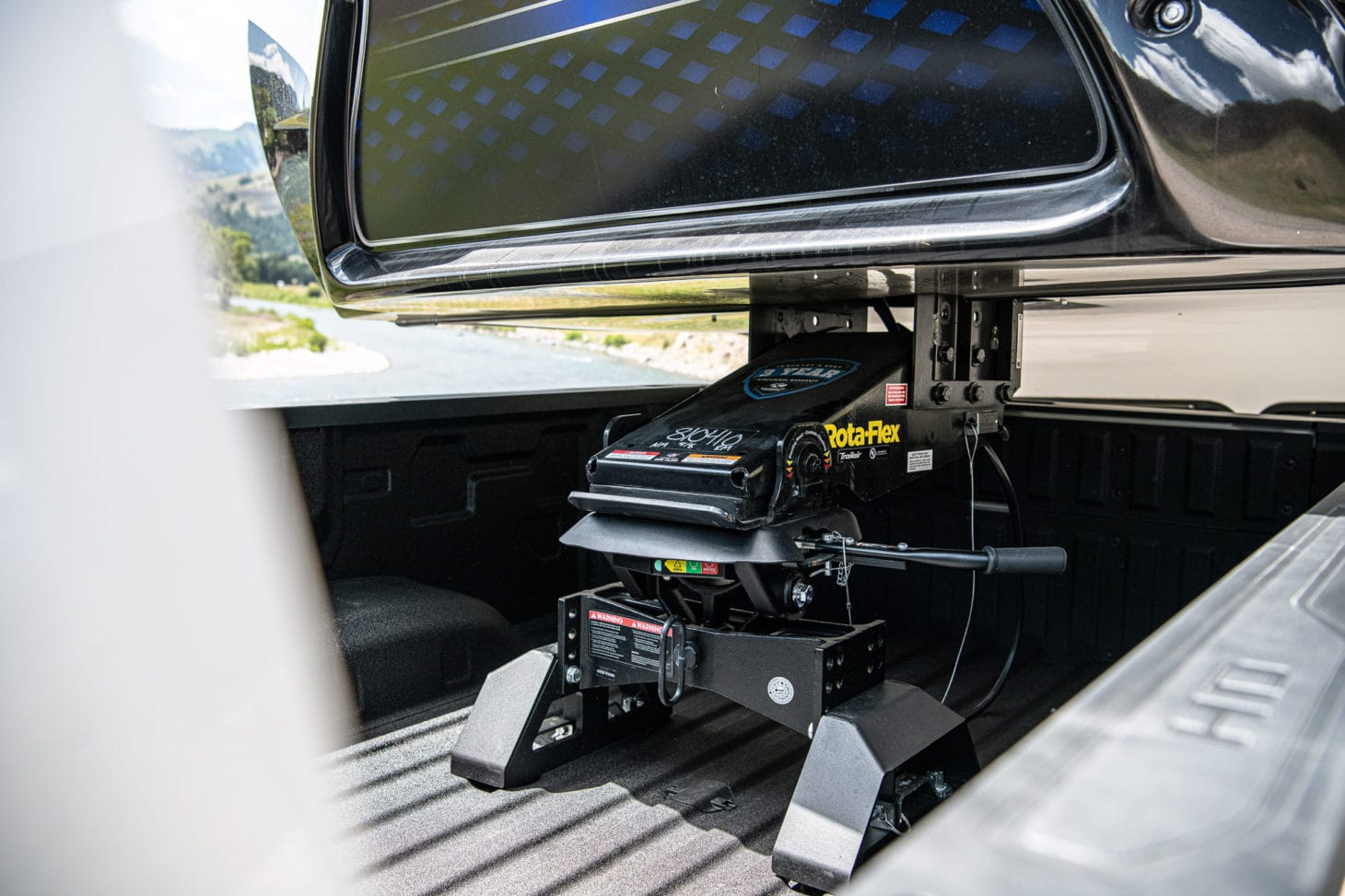
The truck’s payload also plays an important role in a fifth wheel combination because it has high weights that are transferred to the truck. This is why some people find the need to go from a three-quarter-ton truck to a one-ton—for example, if you have a 2500 HD truck, but the fifth wheel’s pin weight, plus passengers, exceed 3,000 pounds. The average 2500 payload maxes out around 3,000 pounds, but the average 3500 can handle 4,000 pounds plus.
The Best Trucks for Towing
Towing a trailer or fifth wheel takes raw power, a transmission that’s built to distribute that power, a cooling system to keep everything from melting, brakes to be able to stop it, and axles and suspension to support the weight.
It’s crucial to carefully check the specifications of a truck. Why? The engine, gearing, length, cab style, bed style, axles, and towing packages all affect the truck’s towing capacity. While a properly configured RAM 3500 can tow upwards of 37,000 pounds, that capacity drops significantly without the right features and options.
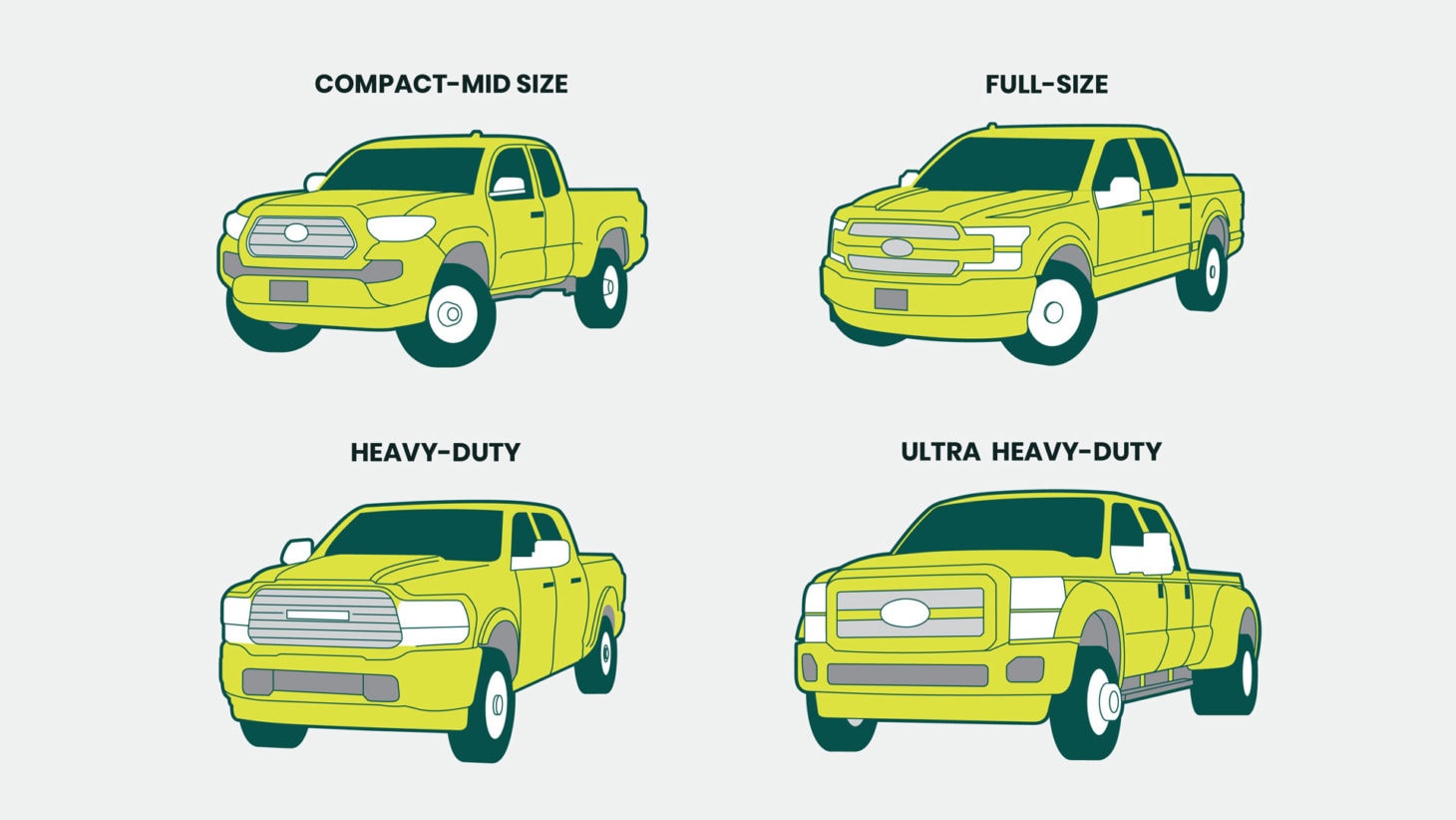
Here are trucks available in the U.S. ranked by towing capacity in their respective segments.
Note: Keep in mind that base payload numbers listed are from a standard truck. The realistic payload may be slightly lower depending on additional features and options that add weight and reduce payload capacity.
And when it comes to hitching up, Gen-Y Hitch is the highest quality truck hitch on the market. Click the pic below and use code RTHITCH10 to save 10% on all products!

Mid-Size/Compact Trucks
Weekend warriors love compact trucks. They’re great for hauling small campers, boats, and motorcycles with maximum towing capacities ranging from 5,000 to 7,700 pounds.
Honda Ridgeline
- Base towing capacity: 3,500 lbs. (for models without AWD or towing package)
- Max towing capacity: 5,000 lbs. (available for all trim levels when properly equipped)
- Base payload: 1,452 lbs.
- Max payload: 1,583 lbs.
Nissan Frontier
- Base towing capacity: 3,790 lbs.
- Max. towing capacity: 6,640 lbs.
- Base payload: 1,020 lbs. (varies depending on the configuration)
- Max. payload: 1,620 lbs.
Toyota Tacoma
- Base towing capacity: 3,500 lbs.
- Max. towing capacity: 6,800 lbs.
- Base payload: 1,155 lbs.
- Max. payload: 1,620 lbs.
Ford Ranger
- Base towing capacity: 3,500 lbs.
- Max. towing capacity: 7,500 lbs.
- Base payload: 1,560 lbs.
- Max. payload: 1,847 lbs.
Chevrolet Colorado / GMC Canyon
- Base towing capacity: 3,500 lbs.
- Max. towing capacity: 7,700 lbs.
- Base payload: 1,190 lbs.
- Max. payload: 1,684 lbs.
Jeep Gladiator
- Base towing capacity: 4,000 lbs.
- Max. towing capacity: 7,700 lbs. (with the Max Tow Package)
- Base payload: 1,150 lbs.
- Max. payload: 1,725 lbs.
Full-Size Trucks
Full-size trucks, or half-ton trucks, are also popular. These rugged pickups are designed with plenty of torque for pulling power. Maximum towing capacities in this segment range from 9,740 to 13,200 pounds.
Nissan Titan
- Base towing capacity: 9,210 lbs.
- Max. towing capacity: 9,370 lbs.
- Base payload: 1,580 lbs.
- Max. payload: 1,680 lbs.
Toyota Tundra
- Base towing capacity: 9,200 lbs.
- Max. towing capacity: 10,200 lbs.
- Base payload: 1,560 lbs.
- Max. payload: 1,730 lbs.
Chevrolet Silverado / GMC Sierra 1500
- Base towing capacity: 6,800 lbs.
- Max. towing capacity: 13,400 lbs.
- Base payload: 1,600 lbs.
- Max. payload: 2,110 lbs.
RAM 1500
- Base towing capacity: 6,390 lbs.
- Max. towing capacity: 12,750 lbs.
- Base payload: 1,200 lbs.
- Max. payload: 2,300 lbs.
Ford F-150
- Base towing capacity: 7,700 lbs.
- Max. towing capacity: 13,200 lbs.
- Base payload: 1,990 lbs.
- Max. payload: 3,270 lbs.
Heavy-Duty Trucks
Heavy-duty trucks are also referred to as three-quarter-ton trucks. If you own a large fifth wheel trailer or a long travel trailer, you should consider this category of trucks. They come with gooseneck and fifth-wheel hitch options that place your load directly over the axle for greater towing capacities in this segment. The added weight of the truck will also help reduce sway and provide a safer towing experience.
Nissan Titan XD
- Max. towing capacity, conventional: 10,880 lbs.
- Max. towing capacity, fifth wheel: 11,040 lbs.
- Base payload: 1,580 lbs.
- Max. payload: 2,240 lbs.
RAM 2500
- Max. towing capacity, conventional: 10,580 lbs.
- Max. towing capacity, fifth wheel: 19,680 lbs.
- Base payload: 1,620 lbs.
- Max. payload: 4,010 lbs.
Chevrolet Silverado / GMC Sierra 2500
- Max. towing capacity, conventional: 20,000 lbs.
- Max. towing capacity, fifth wheel: 31,180 lbs.
- Base payload: 2,047 lbs.
- Max. payload: 6,610 lbs.
Ford Super Duty F-250
- Max. towing capacity, conventional: 18,200 lbs.
- Max. towing capacity, fifth wheel: 22,800 lbs.
- Base payload: 3,040 lbs.
- Max. payload: 4,160 lbs.
Ultra-Duty Trucks
Ultra-duty trucks are the heroes of hauling. If you own an extra-large fifth wheel, you will probably need one of these. Their maximum towing capacity ranges from 20,000 to 32,000 pounds. While powerful, they probably won’t ride as well as lighter trucks.
Ultra-duty trucks come equipped with either single rear wheels (SRW) or dual rear wheels (DRW), also known as dually trucks. If you’re comparing the two, it’s helpful to know that single rear wheel trucks have less payload capacity, but dually trucks cost more to buy and require higher maintenance due to the extra tires. Dually trucks are wider and harder to live with as an everyday driver but handle the RV better, offering more stability on the road.
Note: The highest payload and towing capacity numbers listed below are for the DRW versions of these trucks.
RAM 3500
- Max. towing capacity, conventional: 18,210 lbs.
- Max. towing capacity, fifth wheel: 37,090 lbs.
- Base payload: 4,860 lbs.
- Max. payload: 7,680 lbs.
Chevrolet Silverado / GMC Sierra 3500
- Max. towing capacity, conventional: 20,000 lbs.
- Max. towing capacity, fifth wheel: 36,000 lbs.
- Base payload: 3,862 lbs.
- Max. payload: 7,442 lbs.
Ford Super Duty F-350
- Max. towing capacity, conventional: 21,200 lbs.
- Max. towing capacity, fifth wheel: 38,000 lbs.
- Base payload: 3,800 lbs.
- Max. payload: 7,850 lbs.
And when it comes to hitching up, Gen-Y Hitch is the highest quality truck hitch on the market. Click the pic below and use code RTHITCH10 to save 10% on all products!

Where to Compare Trucks for Towing
For more brand-specific towing information, check out these links:
Domestic
- Ford RV Trailer and Towing Guide
- GMC Trailering and Towing Guide
- Chevy Trucks Trailering and Towing Guide
- RAM Trucks Towing and Payload Capacity Guide
Imports
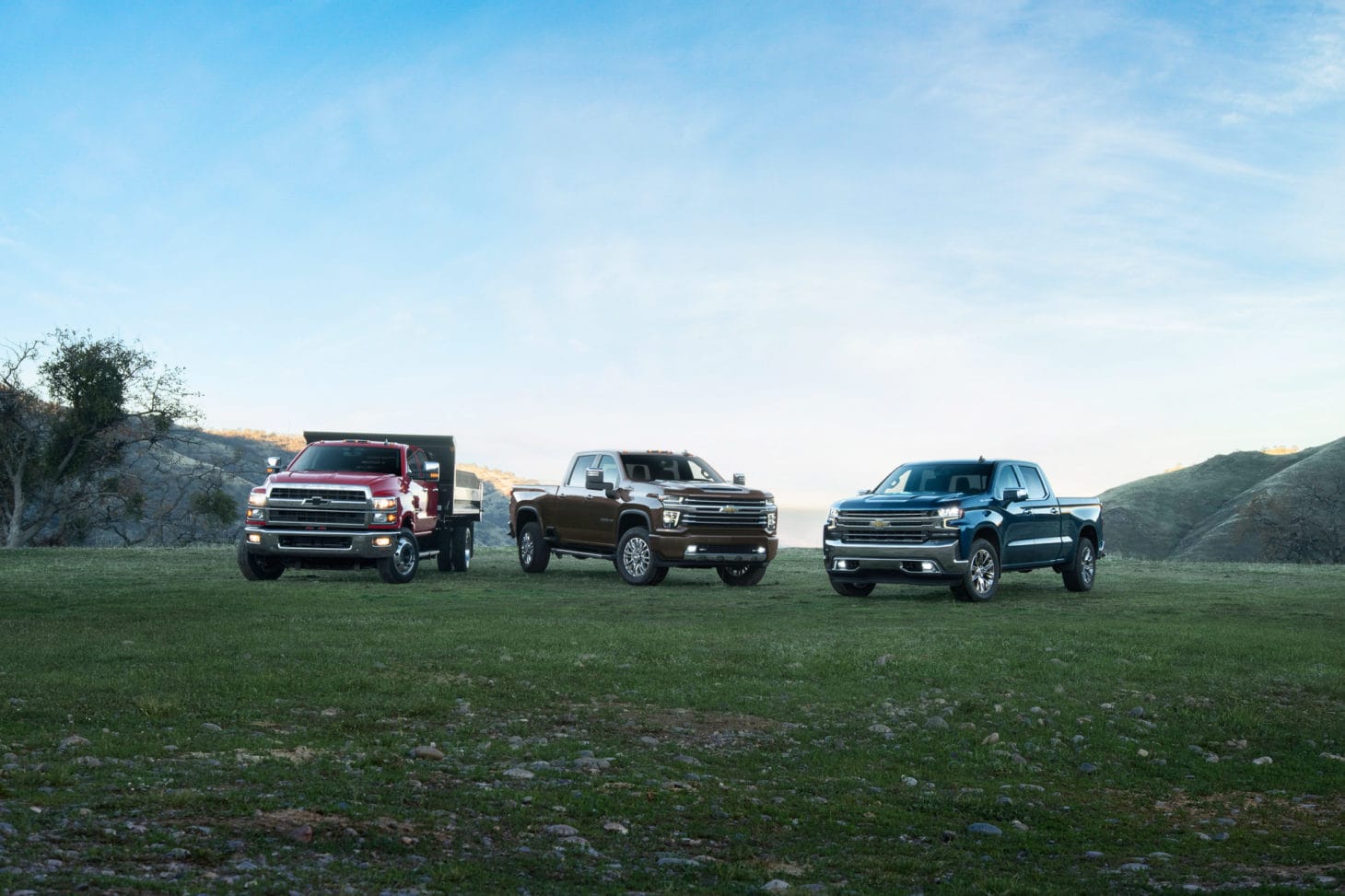
Features to Consider When Purchasing a Truck for Towing
Gas vs. Diesel Engines
Diesel engines are great for towing because they give you low-end torque. That’s why they’re so popular with commercial towing businesses. Diesel engines provide a useful combination of everyday driving fuel economy with torque capability for pulling an RV. These engines have similar pulling characteristics to a larger V8 but get better fuel economy and range.
In prior years, diesel engines were limited to heavy-duty trucks, but now you can find lightweight trucks with high-performance diesel engines. There’s also been an increase in mid-size and full-size trucks offering small turbo diesel engines in models like the Chevrolet Colorado / GMC Canyon, Jeep Gladiator, Ford F-150, GM 1500 Silverado and Sierra, and RAM 1500.
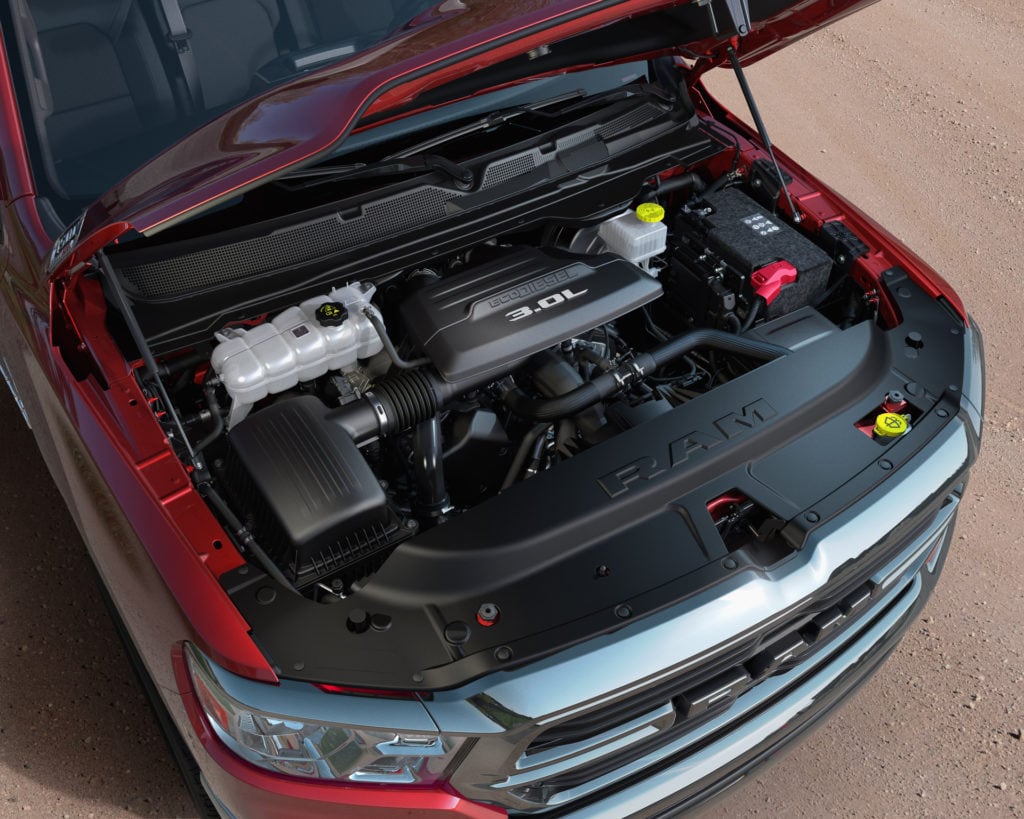
While diesel engines have their benefits, they can add thousands of dollars to the purchase price.
Pros of a Diesel Truck:
- Higher towing capacity and better towing experience
- Safer descending when towing because the diesel engine has an engine brake feature to help the regular brake system not overheat
- Better fuel economy and range when towing
- Designed for a higher number of operating miles
- Higher resale value in the used market
- More torque makes the truck fun to drive
Cons of a Diesel Truck
- Limited to fuel stations or pumps with diesel gas
- Diesel Exhaust Fluid (DEF) also needs to be filled
- Higher cost of diesel at the pump
- Service and repair costs are higher
- Diesel engine option costs more
- The diesel engine weighs more and reduces payload capacity
Consider how often you’re going to tow your RV. While diesel engines can tow more and may have better fuel economy, you might be better off with a gas engine if you aren’t towing very often.
And when it comes to hitching up, Gen-Y Hitch is the highest quality truck hitch on the market. Click the pic below and use code RTHITCH10 to save 10% on all products!

Four-Wheel Drive
You’ll also want to consider if you need four-wheel drive, or if two-wheel drive will suffice. Nearly all pickups are based on rear-wheel drive platforms, which are designed to move heavy loads.
Traditional four-wheel drive (often called 4×4 or 4WD) is a part-time system that you turn on with a rotary switch, button, or lever when you need it. You can also select a low-range setting for challenging off-road conditions.
Full-time four-wheel drive is more versatile and is optional on some pickups. It kicks in as needed to enhance your traction, and your truck can run indefinitely in that mode without harming the drivetrain.
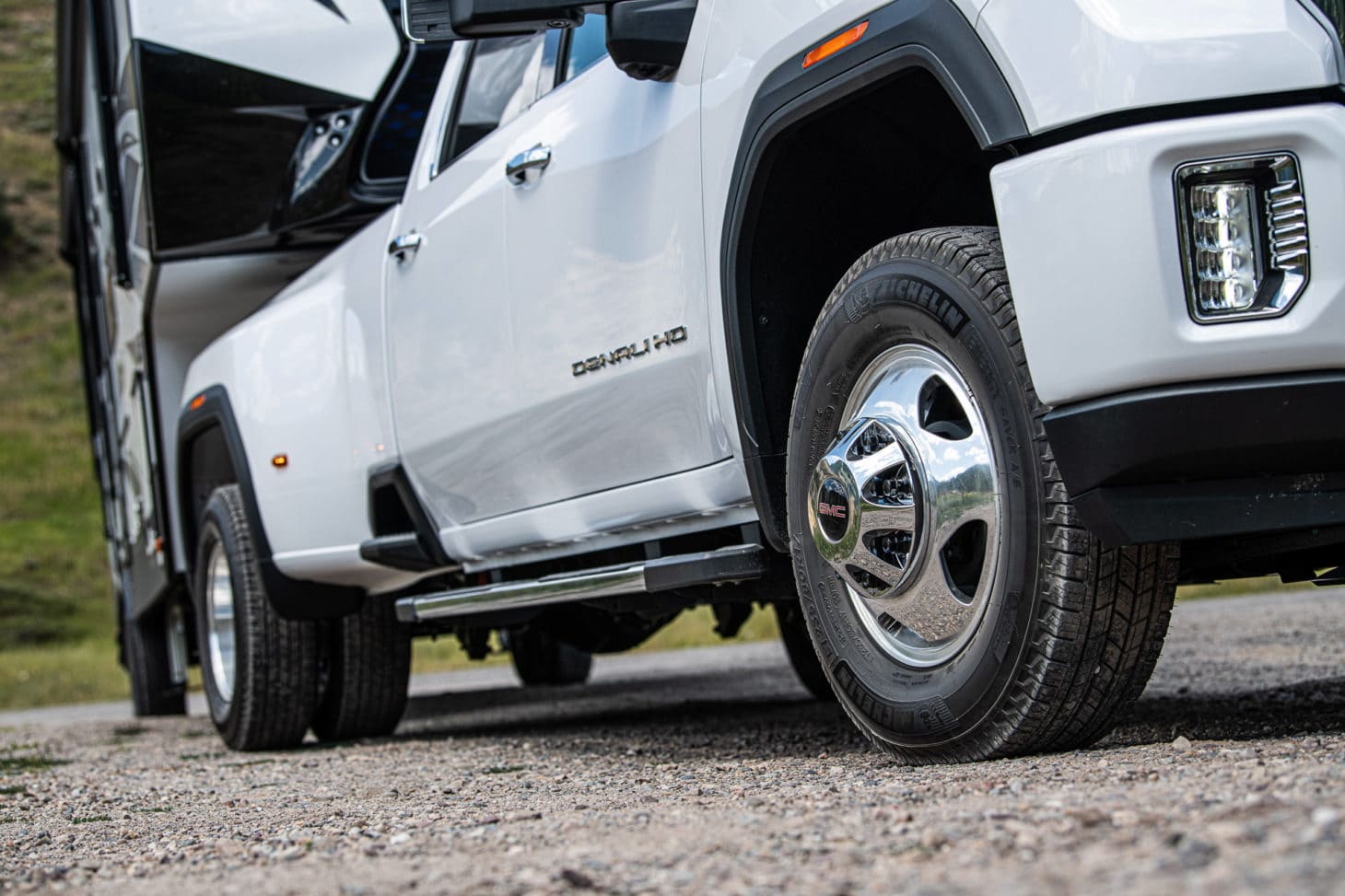
Here’s the trade-off: Four-wheel drive vehicles are typically a bit heavier because of the weight of the four-wheel drive components. They also usually have a slightly lower towing rating and less fuel efficiency than the same vehicle with two-wheel drive.
Here are some high-performance truck models that have four-wheel drive but less payload and towing capacity because the suspension is softer, designed for trails and sand capability:
- Ford Raptor to the F-150
- Chevrolet Silverado Trailboss / GMC Sierra AT4
- RAM Rebel and TRX to the RAM 1500
- Toyota TRD Pro trims on the Tundra and Tacoma
- Jeep Gladiator Rubicon and Mojave to the regular Sport with Max Tow
- Chevrolet Colorado ZR2 trim level
If you’re planning to tackle tough terrain, go off-roading, or travel in the winter, you might need the extra grip of four-wheel drive. You don’t want to get stuck on soft ground or a hill with loose gravel wishing you’d gone with the more aggressive powertrain.
Cab Types
When looking for a pickup, you need to consider the three different types of cabs: regular cab (two-door), extended cab (three-door), or crew cab (four-door).
Regular two-door cabs offer some advantages: They’re typically less expensive and are shorter and lighter, giving you an increase in payload. But if you need room for more passengers, consider the extended and crew cabs.
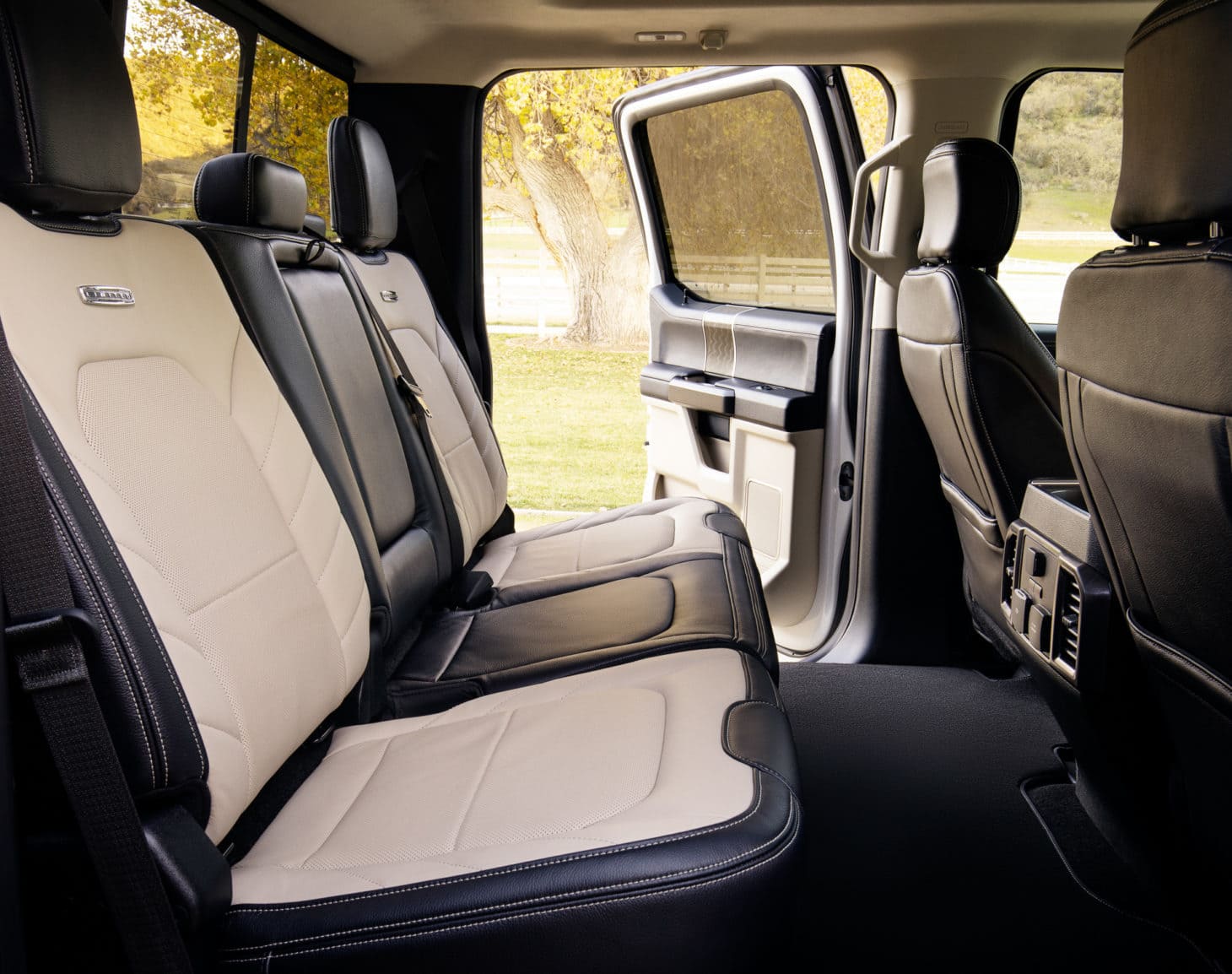
Extended cabs give you additional interior storage. The rear seats may make adults feel cramped but are typically comfortable enough for kids.
Crew cabs with four regular doors give you ample room for seating or cargo, similar to full-sized SUVs. However, these large cabs usually come at the expense of a smaller cargo bed and the least amount of payload versus the other cabs.
Truck Beds
Here’s another truck decision you’ll need to make: long- or short-bed pickup? If you choose a short-bed pickup, it will be easier to drive and park when you’re not towing. Parking your trailer at the campground should be easier, too. However, a shorter bed truck also means a shorter wheelbase (the space between the front and rear wheels). The longer the wheelbase of the truck, the better it will be at holding trailer sway steady when towing.
Long-bed trucks will give you more space—and more options. Long bed trucks are also more in demand, so they typically command a higher resale price.
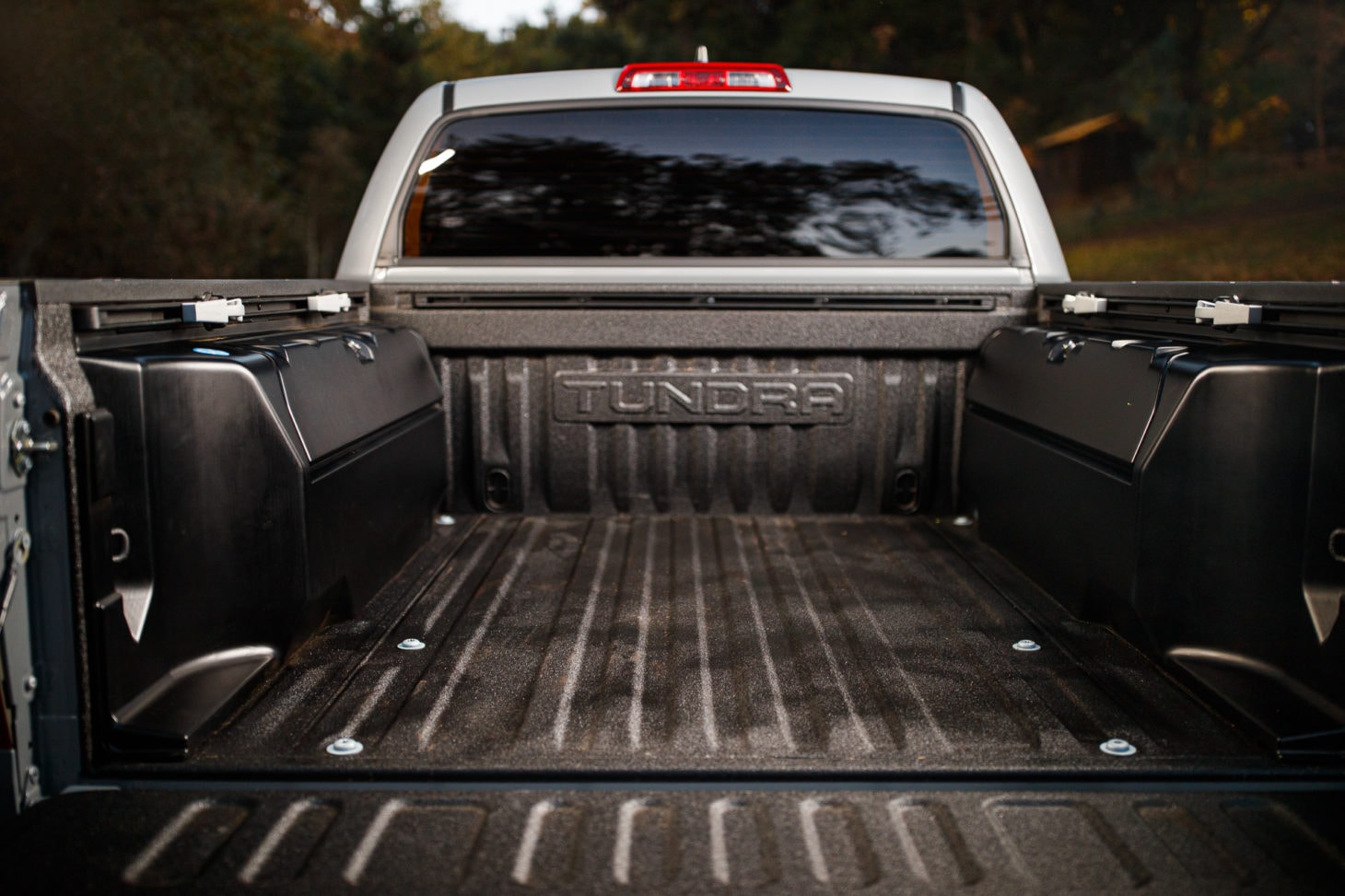
The standard cargo bed length is 8 feet for a full-sized pickup, 6 feet for an extended cab, and 5 feet for a crew cab. Cargo beds for compact pickups usually range from 5 to 6 feet. Fold-out bed extenders are widely available as well. These extenders flip over from within the bed, fencing off the open tailgate to allow you to secure bulkier or longer cargo.
If you are towing a fifth wheel, short beds are not recommended. Since the hitch is inside the bed, a longer bed will keep the fifth wheel further away from the cab. People do tow fifth wheels with short beds, but you’ll typically find that the trailer is making contact with the rear cab’s window with this setup. It can also be a close call when backing up as the corner of the fifth wheel swings.
And when it comes to hitching up for fifth-wheel or bumper pull trailers, Gen-Y Hitch is the highest quality truck hitch on the market. Click the pic below and use code RTHITCH10 to save 10% on all products!

Additional Features
Automakers continue to add advanced safety technologies to their lineups, including electronic braking, stability control, traction control, tire pressure monitoring (TPM), lane departure warnings, and crash avoidance.
Most trucks now come standard with apps on their in dash screen. Many trucks also feature Apple CarPlay and Android Auto to easily mirror your phone screen.
Some of these features come standard and others are optional, so you’ll want to do some research to decide what’s necessary for your rig.
Trailer Brake Controller
Most trucks that come with a towing option will also come with a trailer brake controller included. This system applies the brakes to the camper when the driver uses the brakes on the truck. This allows both the camper and the truck to each use their own brakes to slow down or stop safely.
Blind Spot Monitoring
This feature alerts the driver when another vehicle is in its blind spot. Most vehicles come with this feature standard, as part of a package of safety features. Now some trucks also have the capability to alert the driver when there is a vehicle in the blind spot of the camper.
Cameras
Most vehicles come with a rear backup camera and each manufacturer’s offerings vary. Most will provide an image (varying in resolution quality) from the back view of the truck, lines that guide the driver on a projected path, and zoom-in view. The best systems offer multiple angles on the truck: a front bumper view, wheels view, rear truck bed view, rear hitch view, and a bird’s eye view. The top-of-the-line systems allow for an RV’s rear camera to integrate into the truck’s infotainment system and provide that view, as well.
Be aware that in the mid-size truck category, this feature isn’t standard and may not even be available as an option in some. The aftermarket takes care of this by offering solid units that can be installed in your truck. Some trucks—like the Silverado, RAM models, or F-150—even have wiring ready for installation if they don’t already come with this feature.
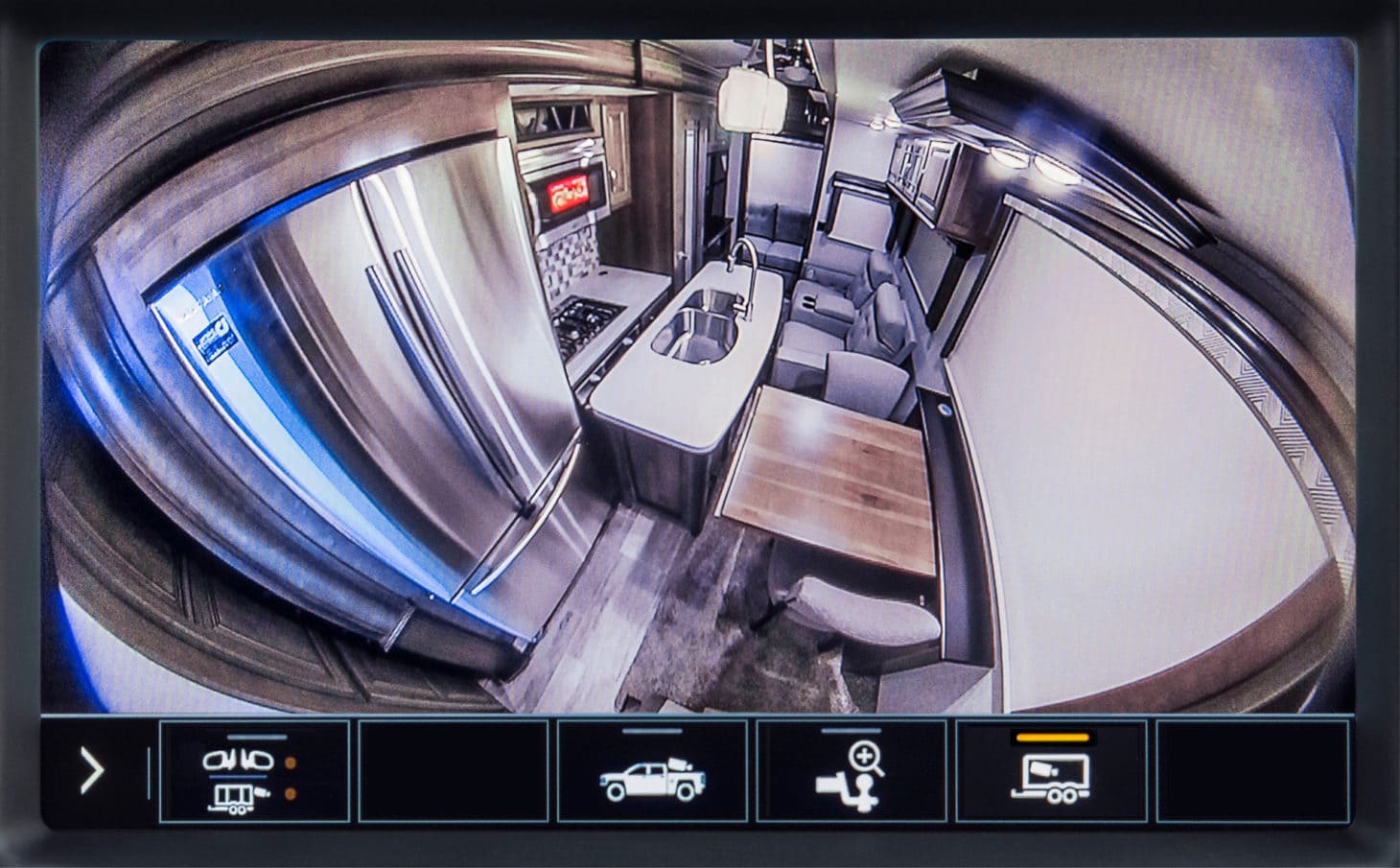
Remote Trailer Light Check
Some models allow you to check your trailer lights by cycling through the lights with a smart key fob.
Trailer Backup Assist
Backup assist technologies increase your confidence in backing up your trailer. While the feature varies slightly by automaker, the concept remains the same.
Trailer Sway Control
This feature gives you confidence that you’re in complete control of your trailer. Some trucks offer a stability system and software to automatically respond to sway.
Trailer Tire Pressure Monitoring System
This feature monitors the pressure of your trailer tires. It also allows you to monitor the temperature of the tires to help prevent blowouts caused by overheating.
Final Considerations for Purchasing a Tow Vehicle
Once you’ve narrowed down your options—from truck size to additional upgrades—look at consumer reports and Facebook groups for feedback on how the truck fares with current owners that tow. You’ll also want to take into account the time of year you’re looking to buy your truck and if you can take advantage of dealer incentives or holiday sales.
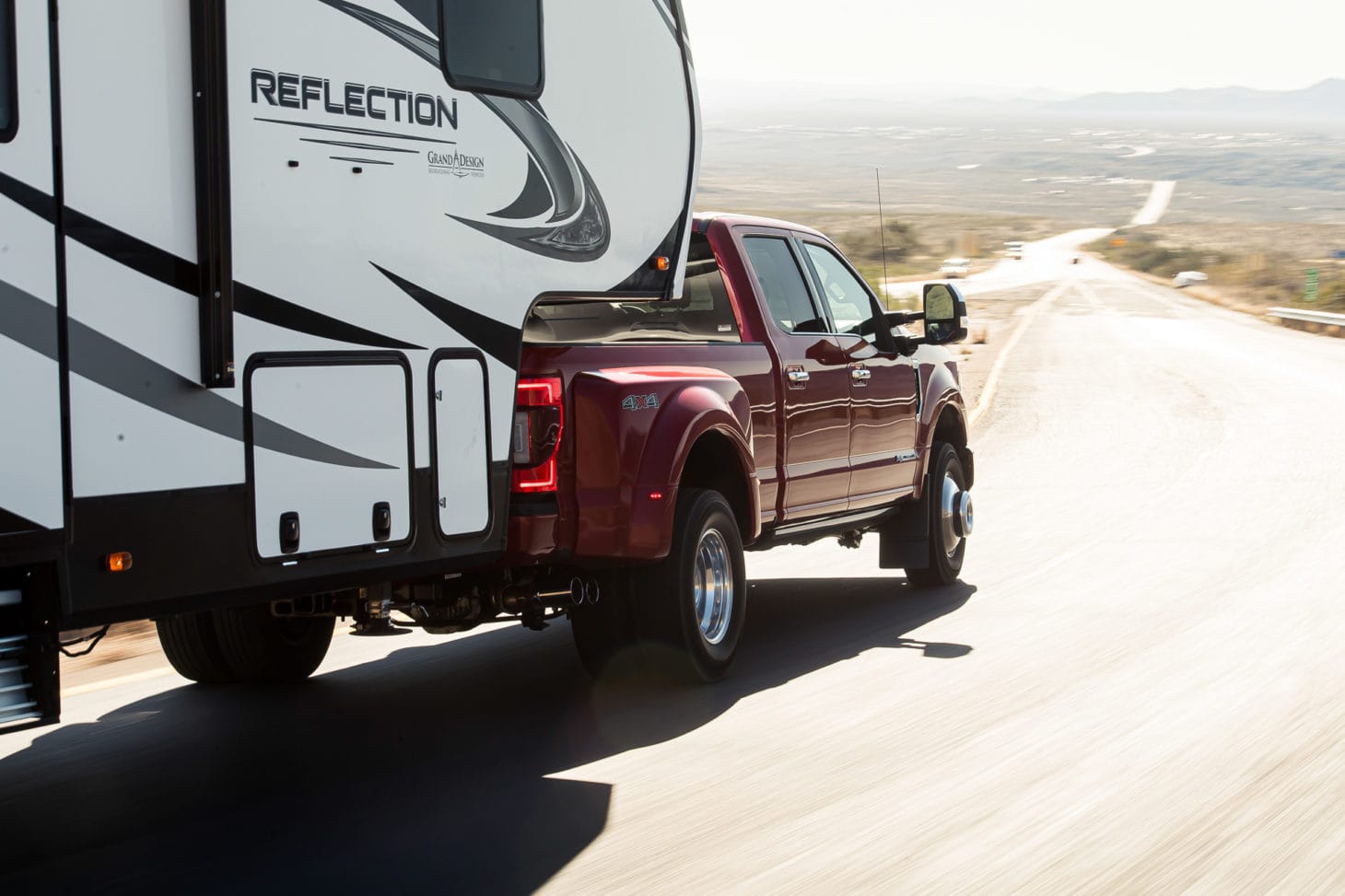
Keep in mind that salespeople at dealerships might not be the best source of information for specific towing questions as they can be focused on what’s popular rather than practical. Even within certain brand models, there will be differences that can drastically change how much the truck can tow.
Now you can go start your tow vehicle shopping journey armed with the right knowledge, questions to ask, and proper terminology to buy the right vehicle for not only your rig but also your lifestyle.
And when it comes to hitching up, Gen-Y Hitch is the highest quality truck hitch on the market. Click the pic below and use code RTHITCH10 to save 10% on all products!



